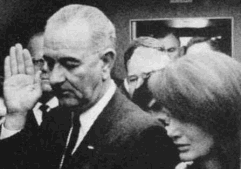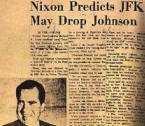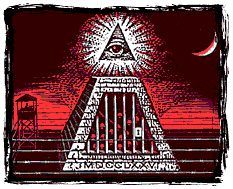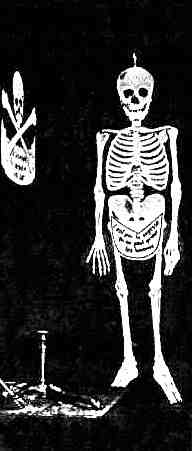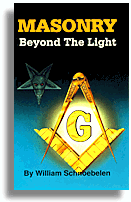 |
| Vatican Double Eagles of the Dragon, the Devil, the Serpent of Old - Satan |
| ||
The first step is the work inside the lodges. Freemasonry gradually steeps its initiates in Masonic principles and ideas. It is a more subtle equivalent of Communist brainwashing techniques. The brethren formed in this way comprise groups active outside the lodges. Secondly is the work of propaganda in the outside world. Freemasonry has perfected a very effective technique of occult propaganda in the world at large, which consists in spreading and imposing Masonic ideals outside the lodges, without revealing the secret source from which these currents originate. As one of the speakers at the 1922 Convent of the Grand Orient expressed it, "Masonry should be felt everywhere, but nowhere should its face be unveiled". It consists in spreading belief in the natural, inevitable and irresistible evolution of human progress. The third step towards the final objective is in the field of political activity. The ideological propaganda, as described above, runs parallel with the political conspiracy, whose object is to seize power and place Freemasons in positions of command. As far as possible, the public is not to know that they are Masons. All this vast field of activity is protected by two secrets: the esoteric secret inside the Masonic lodges; and the secret political action outside the lodges. Let us now pass on to study the nature of the esoteric secret. In the first stage, new members are attracted by Freemasonry's generous and humanitarian professions of faith, and also by promises of influence and concealed assistance. Candidates are carefully chosen and thoroughly vetted long before they are even approached. When they are received into the lodge, they are made to take an oath of secrecy, which is renewed every time they advance to a higher degree. At this point commences the second stage in the candidate's formation; as soon as he has become a Mason, a process of doctrinal formation (or brainwashing) begins, which will continue all his life. The statements of principle are cleverly worded in vague, generous, humanitarian terms which can be interpreted in many very different ways. Cautiously, and by easy stages, a neophyte learns that these terms have a hidden meaning, a higher meaning, which he will not understand until he has undergone further initiation. In this way, he learns, one by one, of a succession of hidden meanings, which he is told are an ascent towards the Light, and in which he gradually becomes steeped. This is the purpose of the succession of different degrees; if the Mason is receptive, he climbs upward in the Masonic hierarchy, and yet he never at any time knows exactly where he stands in it, nor how many higher degrees or persons control the organisation. As in the secret Communist organisation, one is never very sure whether the titular degrees correspond to the real seat of power. Freemasonry is therefore in a sense a succession of secret societies superimposed on one another, whose mode of operation has been slowly laid bare, at least in broad outline, by a series of patient investigators; nevertheless, it remains unknown to the public at large and, all in all, continues to be very effective. To justify the above statements, here are a few Masonic texts emanating from highly-placed dignitaries in the Order, who themselves admit to being initiates at a high level. "The Blue Degrees", wrote Albert Pike, "are but the outer court or portico of the Temple. Part of the symbols are displayed there to the Initiate, but he is intentionally misled by false interpretations. It is not intended that he shall understand them; but it is intended that he shall imagine he understands them. Their true explanation is reserved for the Adepts, the Princes of Masonry. The whole body of the Royal and Sacerdotal Art was hidden so carefully, centuries since, in the High Degrees, as that it is even yet impossible to solve many of the enigmas which they contain. It is well enough for the mass of those called Masons, to imagine that all is contained in the Blue Degrees; and whoso attempts to undeceive them will labour in vain, and without any true reward violate his obligations as an Adept. Masonry is the veritable Sphinx, buried to the head in the sands heaped round it by the ages." (A. Pike: Morals and Dogma, p. 819) The well-known English Mason, Wilmshurst, says the same thing: "The method in question (of Freemasonry) is that of initiation; the usage and practice is that of allegory and symbol, which it is the Freemason's duty, if he wishes to understand his system, to labour to interpret and to put to personal interpretation. If he fails to do so, he still remains—and the system deliberately intends that he should—in the dark about the Order's real meaning and secrets, although formerly a member of it." (W. L. Wilmshurst : The Masonic Initiation, 1957, PP- 4-5) And further on he says: "We profess to confer initiation, but few Masons know what real initiation involves; very few, one fears, would have the wish, the courage, or the willingness to make the necessary sacrifices to attain it if they did." ( W. L. Wilmshurst, ibid., p. 17) For his part, Brother Oswald Wirth, so praised by Mellor, tells us: "When Freemasonry, or for that matter any other confraternity based on initiation, prides itself on its impenetrable veil of secrecy, it is not a case of the transferable but of the intelligible content of the mysteries. One can divulge only the dead letter, not the spirit, which of its own accord reveals itself to those who are privileged to understand. "It is a serious matter to ask for Initiation, for one has to sign a pact. Agreed, there is no external, formal, visible signature; it cannot be compared with signing one's name in blood, for being purely moral and immaterial, it demands that the man's soul be truly committed in the act. It is not, then, like driving a bargain with the Devil, in which the Evil One allows himself to be tricked; it is an agreement entered into seriously on both sides, and there is no escape from its clauses. The Initiates in fact contract into certain duties towards the pupil thus admitted to their school, yet the pupil himself is by that very fact indissolubly bound to his masters. . . . "Note that the guides are never seen and do not thrust themselves forward. . . . "At the basis of any real initiation there are certain duties contracted. Beware then of knocking at the door of the Temple if you are not resolved to become a new man. . . . "It would all be nothing more than a snare and a delusion, if you could ask to be initiated free of all obligation, without paying with your very soul for your entry into brotherly communion with the builders of this great humanitarian edifice, whose design has been traced by the Great Architect of the Universe. . . ." (O. Wirth: L'Idéal Initiatique, pp. 10-11) Thus, there is a secret theology in Freemasonry, to use the trenchant expression of Rabbi Benamozegh, in his book Israel et l'Humanité, and in this context he is in full agreement with the Masonic writers from whom we have just quoted, whether French, like Oswald Wirth, English, like Wilmshurst, or American, like Albert Pike; whether "regular" or "irregular", to use Mr. Mellor's terms. Then comes the second stage in the activities of Masonry—secret activity outside the lodges—which consists in spreading and implanting throughout the world the philosophical ideas of Freemasonry tinder a general cover of humanitarianism. This work is accomplished by secret infiltration and the undercover circulation of ideas, by means of a technique admirably described for us by the Freemason Regis, when speaking at the Convent of the Grand Orient in 1928: "Under the Grand Orient's influence, and in the calm and silence of our Temples, we should study all the most important questions affecting the life of communities, of the Nation, and of Humanity at large. Our Brethren will be thoroughly well-informed; they will leave the Temple well-instructed, fully equipped for the struggle ahead. They will leave behind them their aprons and their outward insignia of Masonry; they will go down into the city just as ordinary citizens, but each one will be thoroughly steeped in our outlook, and each, in his own profane circle, in his party or his union, will act according to his conscience—yet, I repeat, he will be saturated in the teaching he has received. "Rich will be the result—not because it is occult, but because the influence of Masonry will gradually seep in everywhere; to the bewilderment of the profane world, the same spirit and the same unity of action will force their way to the front, and, as in a well constructed syllogism, a certain conclusion bearing fateful consequences will gradually emerge and impose itself on its profane environment. "Over and above all our other loyalties, a power we cannot deny governs us; that power is the spiritual power called Freemasonry. "And why not follow these proud thoughts to their logical conclusion? Because we know more, because we have worked along sounder lines, than the mass of those who belong to profane groups, it is almost inevitable that we should take over their leadership. Let us not hide our light under a bushel; to a large extent it has already happened, and thus many profane bodies are without question receiving an infusion of our warm, living blood. I am perfectly well aware that we do, discreetly, form the elite in all the big social and political parties, and that thus we are sure of being able to control their policy. It is our duty-I repeat, our duty-to make sure that we control the politicians who are elected, that we right their wrongs, and show them their mistakes, and reproach them for what they have failed to do. In a word, Freemasonry should be the `politician's conscience'." (Brother Regis, Convent of the Grand Orient 1928, p. 256) Finally, we come to the third stage in the work of Masonry, that of its direct intervention in politics. This is how Leo XIII described it in his Encyclical of 19th March, 1902: "Freemasonry is the permanent personification of the Revolution; it constitutes a sort of society in reverse whose aim is to exercise an occult overlordship upon society as we know it, and whose sole raison d'étre consists in waging war against God and His Church." (Encyclical: On the 25th Year of Our Pontificate) It is instructive, in this context, to compare the conclusion of the famous Pope with the following passages from the equally renowned Freemason, Oswald Wirth: "The cause of Freemasonry became identified with the cause of the Republic, and if electoral campaigns sometimes did absorb too much time in the affairs of the lodges, the reason is that all friends of progress, seeking to strike a final blow at clericals and reactionaries, rallied together under the banner of Masonry." (O. Wirth : Le Livre de l'Apprenti, p. 80) "If at these moments of civil distress, the lodges had limited themselves to what we may call their normal peacetime occupation, they would have failed in their most sacred duty, for they would have been refusing to defend that heritage of liberties conquered by our valiant ancestors. It is to their honour that they have broken their rule, launching themselves with all haste into the political arena. They formed themselves into electoral committees to save the Republic, forgetful for the moment of that lofty humanitarian philosophy whose cultivation is the basic aim of Freemasonry." (O. Wirth : L'Idéal Initiatique, p. 82) Freemasonry has played a leading part in international politics, and especially in all the revolutionary movements which have shaken Europe and the world since 1789: in 1830, 1848, and 1871 in France; in 1848 and 1917 elsewhere in Europe, to mention only the most important instances. Freemasonry boasts of having been both the inspiration and the secret ruler of the Third Republic in France (1870-1939), and it is Freemasonry which has always been in the vanguard of the struggle against the Catholic Church in France, Italy, Spain, Portugal and Austria—or, in a word, wherever the Church was the religion of the country. We do not propose to re-write that history here, nor even to summarise Freemasonry's political activities; we only mention it to remind the reader that this is a factor which must be taken into account. (For a complete study of this question, see Leon de Poncins : The Secret Powers behind Revolution.) But one point which we must emphasise in this context is the secrecy surrounding all these activities. Freemasonry is practically never mentioned in the Press; history books are silent about the power and influence of the Order, and governments and parliaments never dare debate such a dangerous subject. Reports of Masonic meetings and Congresses are not available to the public; Masonic magazines and publications are not placed in the Bibliothéque Nationale or the British Museum, although the law of the land demands it. In general, we can say that Freemasonry has succeeded in keeping its political activities secret. But no secret can be kept indefinitely, and it is nearly always possible to discover the Masonic origins of such and such a political decision—only by that time it is usually too late to hinder it. We have chosen the following examples from history to illustrate this point: The peace treaty of 1918 was directly inspired by Masonry. Its clauses had been worked out at a great international Masonic conference which took place on 28th, 29th and 30th June, 1917, at the headquarters of the Grand Orient of France in the Rue Cadet, Paris. This conference was attended by representatives of the leading lodges of allied and neutral countries—Italy, Switzerland, Belgium, Serbia, Spain, Portugal, Argentina, Brazil, the United States (whence two lodges in Arkansas and Ohio, unrepresented, sent cordial greetings) and so on; only the Grand Lodge of England was unrepresented. In 1936 the complete minutes of this meeting came to light and were published in their entirety, accompanied by a detailed commentary, in Leon de Poncin's : La Société des Nations-Super—Etat Mgonnique, from which all the information and documents in the following paragraphs have been taken. Preparations for the Congress in June were put in hand at an earlier one in January 1917, as the minutes of the subsequent meeting relate: "In sending you the summary of minutes of the Conference of the Masonic Jurisdictions of the Allied Nations, which was held at Paris on 14th and 15th January, 1917, as well as the resolutions and the manifesto therein adopted, it is our privilege to inform you that this Congress decided to hold a Masonic Congress at the Grand Orient of France, in Paris, on 28th, 29th and 30th of June next. "The object of this Congress will be to investigate the means of elaborating the Constitution of the League of Nations, so as to prevent the recurrence of a catastrophe similar to the one at present raging which has plunged the civilised world in mourning. "It was the opinion of this conference that this programme cannot be discussed solely by the Freemasonry of the Allied Nations, and that it is a matter also for the Masonic bodies of the neutral nations to bring what light they can to the discussion of so grave a problem. . . . "It is the duty of Freemasonry at the close of the cruel drama now being played out, to make its great and humanitarian voice heard, and to guide the nations towards a general organisation which will become their safeguard. It would be wanting in its duty, and false to its great principles, were it to remain silent. . . . "It is clearly understood that the Masonic Congress will confine itself entirely to the humanitarian field, and that, in conformity with our Masonic Constitutions, it will not touch on any question of a political nature. "We would be very grateful to receive from you the assurance of your support with the least possible delay. . . ." (Leon de Poncins; La Société des Nations, pp. 65-67) Labels, go to: Freemasonic, Freemasonry, FREEMASONRY and the VATICAN, Judeo Freemasonic ritualistic murder-sacrifice-canabalism of children |


